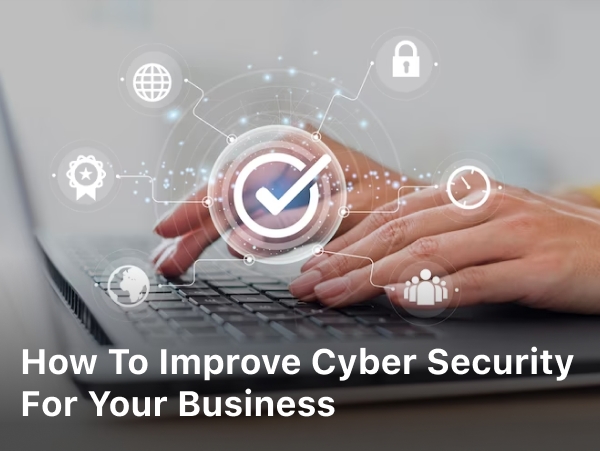How To Improve Cyber Security For Your Business
vpnmighty.com -How To Improve Cyber Security For Your Business. Looking to enhance your online safety? Discover 10 crucial steps on how to improve cyber security and protect your digital assets from potential threats. Read on to safeguard your online presence today!
In today’s fast-paced digital world, the importance of cyber security cannot be overstated. With the rising number of cyber threats and data breaches, individuals and businesses alike must take proactive steps to protect their sensitive information and digital assets.
In this comprehensive guide, we will explore ten essential strategies on how to improve cyber security and fortify your online defenses. By implementing these practical measures, you can significantly reduce the risk of falling victim to cybercrime and enjoy a safer digital experience.
What is Cyber Security?
Cyber Security, also known as Information Security or Computer Security, refers to the practice of protecting digital systems, networks, devices, and data from potential threats and unauthorized access. It encompasses a wide range of measures and technologies designed to safeguard information and ensure the confidentiality, integrity, and availability of digital assets.
The importance of cybersecurity has grown exponentially with the increasing reliance on technology and the internet in both personal and professional spheres. As more sensitive information is stored and transmitted online, the risk of cyber threats has become a significant concern for individuals, businesses, and governments alike.
Cyber security aims to address various types of cyber threats, including:
- Cybercrime: This includes malicious activities such as hacking, phishing, ransomware attacks, and identity theft, which target individuals and organizations to steal valuable information or extort money.
- Cyber Espionage: State-sponsored or corporate espionage involves unauthorized access to sensitive government, corporate, or industrial information for strategic or competitive advantage.
- Cyber Terrorism: Cyber terrorists use technology to disrupt critical infrastructure, cause fear, or spread propaganda, impacting social, economic, or political stability.
- Data Breaches: When unauthorized individuals gain access to databases containing personal or confidential information, it can lead to identity theft, financial loss, and reputational damage.
Keep Reading : Cybersecurity a One Word or Two
How To Improve Cyber Security
1. Strong Password Practices
In this digital age, passwords act as the first line of defense against unauthorized access. Ensure that you follow these best practices to enhance your cyber security:
- Create strong, unique passwords for each online account.
- Utilize a mix of uppercase and lowercase letters, numbers, and special characters.
- Avoid using easily guessable information, such as your birthdate or pet’s name, in passwords.
2. Enable Multi-Factor Authentication (MFA)
In the ever-evolving landscape of cyber threats, passwords alone are often insufficient to protect your online accounts and sensitive information. This is where Multi-Factor Authentication (MFA) comes into play as a powerful ally in enhancing your cyber security.
MFA, also known as Two-Factor Authentication (2FA) or Two-Step Verification, adds an additional layer of protection to the traditional username-password login method. By requiring users to provide two or more forms of identification before granting access, MFA significantly reduces the risk of unauthorized access and strengthens your digital fortress.
3. Keep Software and Systems Updated
In the realm of cyber security, staying one step ahead of potential threats is essential to safeguarding your digital assets. One fundamental practice that can significantly enhance your defense against cyber-attacks is diligently keeping your software and systems updated. Whether it’s your operating system, applications, or firmware, timely updates are crucial in closing security loopholes and fortifying your digital world.
Software developers and technology companies continuously work to improve their products, not only to add new features but also to address security vulnerabilities. Hackers and cybercriminals are relentless in their efforts to exploit weaknesses in outdated software. These vulnerabilities can allow unauthorized access to your devices, data breaches, and even the installation of malware.
By keeping your software and systems up to date, you benefit from the following:
- Security Patches: Updates often include security patches that address known vulnerabilities. By applying these patches, you reduce the risk of falling victim to attacks that exploit these weaknesses.
- Bug Fixes: Software updates also fix bugs and glitches that could impact the performance and stability of your applications and devices.
- Enhanced Features: Alongside security improvements, updates often introduce new features and optimizations, enhancing the user experience and functionality.
- Compatibility: Updates ensure that your software remains compatible with the latest technologies and standards, avoiding potential conflicts or issues.

4. Educate and Train Users
In the realm of cybersecurity, technology and advanced tools are essential, but the human element remains a critical factor in defending against cyber threats. Cybercriminals often exploit human vulnerabilities through social engineering tactics, making it crucial to educate and train users to recognize and respond effectively to potential risks. Empowering individuals with the knowledge and skills to navigate the digital landscape safely can turn them into the first line of defense against cyber-attacks.
The Human Factor in Cyber Security:
No matter how sophisticated your cybersecurity measures may be, human error can still pose significant risks. Phishing emails, deceptive websites, and social engineering attempts can easily trick individuals into revealing sensitive information or unknowingly downloading malware. Cybersecurity awareness and training programs play a pivotal role in equipping users with the necessary tools to identify and thwart such threats.
The Importance of Cybersecurity Education:
- Recognizing Phishing Attempts: Training users to recognize suspicious emails and websites can prevent falling victim to phishing attacks, where cybercriminals masquerade as legitimate entities to steal sensitive data.
- Securing Personal Information: Educating users about the importance of safeguarding personal information, such as passwords and financial details, can help reduce the risk of identity theft and financial fraud.
- Preventing Social Engineering Attacks: Users need to be aware of the various social engineering tactics used by cybercriminals, such as pretexting and baiting, to manipulate individuals into divulging confidential information.
- Safe Internet Practices: Promoting safe internet practices, such as avoiding unsecured Wi-Fi networks, using VPNs, and being cautious while clicking on links, helps mitigate potential risks.
- Device Security: Users should be educated on securing their devices, including setting strong passwords, enabling biometric authentication, and regularly updating software.
- Data Handling and Disposal: Proper data handling and secure disposal of sensitive information are vital to prevent data leaks and unauthorized access.
5. Secure Your Network
Protect your home or business network by taking the following steps:
- Use strong and encrypted passwords for your Wi-Fi network.
- Change default router login credentials.
- Employ a firewall to monitor incoming and outgoing traffic.
Keep Reading : How To Choose a Proxy Network
6. Implement Data Encryption
In an increasingly digital world, data has become one of the most valuable and vulnerable assets for individuals and organizations alike. Protecting sensitive information from unauthorized access is paramount, and data encryption stands as a powerful defense mechanism.
Data encryption transforms plain, readable data into an unintelligible form using complex algorithms, rendering it useless to anyone without the corresponding decryption key. By implementing data encryption, you can fortify your confidential information and ensure its confidentiality, integrity, and authenticity.
7. Regular Data Backups
Frequently backing up your data is an essential practice. In case of a cyber attack or data loss, you can restore your information from backups and minimize potential damage.
The Importance of Regular Data Backups:
- Data Loss Mitigation: Data backups create duplicate copies of your information at a specific point in time. If data is accidentally deleted, becomes corrupted, or falls victim to a cyber-attack, you can restore it from the backup, minimizing potential losses.
- Protection Against Ransomware: Ransomware attacks encrypt your data and demand a ransom for the decryption key. Having recent backups allows you to recover your data without succumbing to the attacker’s demands.
- Disaster Recovery: In the event of hardware failure, natural disasters, or fires, backups provide a means to restore data and resume business operations with minimal downtime.
- Version Control and Historical Data: Backups offer a historical view of your data, enabling you to access previous versions and recover data from different points in time.
- Compliance and Legal Requirements: Many industries have specific data retention and archiving regulations. Regular data backups ensure compliance with these requirements.
8. Invest in Robust Antivirus and Anti-Malware Solutions
Choose a reputable antivirus and anti-malware software to protect your devices from viruses, malware, and other malicious threats.
The Need for Antivirus and Anti-Malware Solutions:
- Detecting and Removing Malware: Malware, including viruses, worms, Trojans, and ransomware, can infect your devices and compromise your data. Antivirus and anti-malware software actively scan for these threats and remove them before they can cause harm.
- Real-Time Protection: Advanced antivirus solutions provide real-time protection, constantly monitoring your system for suspicious activities or attempts to exploit vulnerabilities.
- Safe Web Browsing: Antivirus software often includes features that block malicious websites and phishing attempts, preventing users from accidentally visiting dangerous sites.
- Email Security: Antivirus solutions help identify and block malicious email attachments and links that may lead to malware infections or phishing attacks.
- Zero-Day Exploits: Antivirus vendors regularly update their databases with signatures and heuristics to detect and defend against new, previously unknown threats known as zero-day exploits.
- System Performance: Antivirus software is designed to run efficiently in the background, avoiding unnecessary resource consumption while still providing robust protection.
9. Monitor and Analyze
Set up monitoring tools to detect and analyze suspicious activities on your systems or networks. Early detection can prevent significant data breaches.
The Significance of Monitoring and Analysis:
- Early Threat Detection: Continuous monitoring allows for the early detection of suspicious activities, giving you the opportunity to intervene before a cyber attack gains momentum.
- Real-Time Incident Response: By analyzing network and system logs in real-time, you can rapidly respond to security incidents, minimizing the impact and preventing further escalation.
- Identifying Vulnerabilities: Monitoring helps identify potential security weaknesses and vulnerabilities in your systems, enabling you to address them proactively before they are exploited by malicious actors.
- Insider Threat Detection: Monitoring can help spot abnormal behavior from authorized users, such as employees, mitigating potential insider threats.
- Compliance and Audit Requirements: Regular monitoring and analysis are often necessary to meet regulatory compliance and industry-specific audit requirements.
Keep Reading : What is an Instance in Cloud Computing
10. Develop an Incident Response Plan
Prepare for the worst by creating a comprehensive incident response plan. This plan should outline the necessary steps to take in case of a cyber security breach and allocate responsibilities to team members.
The Importance of an Incident Response Plan:
- Timely Response: An IRP provides a structured and organized approach to respond promptly when an incident occurs, reducing the time it takes to detect, contain, and mitigate the impact of the attack.
- Minimize Damage: With predefined procedures and roles, the IRP helps prevent the incident from escalating and mitigates potential damage to systems, data, and reputation.
- Regulatory Compliance: Many industries and data protection regulations require organizations to have an IRP in place to safeguard customer data and promptly report breaches.
- Effective Coordination: An IRP assigns roles and responsibilities to specific team members, ensuring a coordinated response, better communication, and efficient incident handling.
- Continuous Improvement: Regularly testing and updating the IRP allows organizations to learn from past incidents, adapt to emerging threats, and continuously improve their cyber defense strategies.
Frequently Asked Questions (FAQs)
1. How often should I change my passwords?
Changing your passwords every 3-6 months is generally recommended to maintain good cyber security hygiene.
2. Is free antivirus software sufficient?
While free antivirus software provides some level of protection, premium versions typically offer more advanced features and better defense against emerging threats.
3. Can I use the same password for multiple accounts if it’s strong?
It’s best to avoid using the same password for multiple accounts. If one account gets compromised, all other accounts with the same password become vulnerable.
4. What should I do if I suspect a cyber attack?
Immediately disconnect from the internet and report the incident to your IT department or cyber security experts. Follow your organization’s incident response plan if applicable.
5. How cybersecurity can be improved?
Patches to fix security issues are regularly issued, and not actioning them leaves you wide open to cyberattacks. Software updates are not only important for system speed, but they are vital for protection against cyber threats.
Conclusion
In conclusion, cyber security is not a matter to be taken lightly. By adopting the ten essential steps outlined in this guide, you can significantly enhance your online safety and protect yourself, your family, or your business from potential cyber threats. Remember, staying vigilant and proactive is the key to maintaining a secure digital environment. Safeguard your digital world now and implement these measures to improve your cyber security.
Remember, the world of cyber threats is ever-evolving, so staying informed and updating your defense strategies is crucial. Embrace a proactive approach to cyber security, and you will be better equipped to navigate the digital landscape safely. Protect your digital assets and maintain peace of mind in an increasingly interconnected world.
Stay safe, and keep improving your cyber security!




